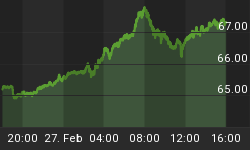Two dissatisfied customers comment about a restaurant. One says, "The food here is terrible." The other replies, "I know, and such small portions!" In many ways, they could be describing our current employment picture. Not only are the portions shrinking, but the jobs themselves are steadily losing quality.
Today's release of the October jobs report showed the loss of another 190,000 jobs had pushed the official unemployment rate to 10.2%, only the second time since the Great Depression that unemployment was quoted in double digits (factoring in workers who had given up job hunting altogether or have settled for part-time work would push that rate to 17.5%). That didn't stop Wall Street pundits from trying to fashion a silk purse of this sow's ear. The 'green shoots' crowd focused on the slowing pace of job losses, the nascent economic 'recovery' (even if it is jobless), and the projected improvement in 2010. No mention was even made of the quality of what few jobs were being created.
The analysts completely ignored the continued trend of replacing goods-producing jobs with those jobs that require production from other sources. For example, we lost 61,000 manufacturing jobs last month, but added 45,000 jobs in education and health services. In particular, the addition of health workers is nothing to celebrate. Just as a family's economic position is not improved by higher medical bills, the country as a whole does not benefit from increased health-care spending. Until this trend reverses, our unbalanced economy will not regain its stability, a real recovery will never take hold, and the overall job outlook will get much bleaker.
By spending trillions of dollars of borrowed money, President Obama hopes to engineer a recovery and create jobs. However, he has only succeeded in digging America into an even deeper hole than the one he inherited from his predecessor. He believes that if we can simply push up spending to levels seen during the "good times," then those favorable economic conditions will return. The reality, of course, was that those good years came with a heavy price-tag that we have barely begun to pay.
In a press conference today, the President claimed that the latest extension of unemployment benefits will not only help the unemployed, but the overall economy as recipients spend the money. If spending government-granted money really were a benefit to the economy, why not simply increase the amounts endlessly? Why limit the benefits to the unemployed? Let's make this recovery a real barn burner: send out million-dollar checks to everyone! Of course, what Obama and his economic advisors do not understand is that money spent by recipients of unemployment benefits is money not spent or invested by taxpayers. It's a transfer of wealth, not a creation on new wealth.
In addition, policymakers are also struggling with diminishing returns on ultra-low interest rates. No matter how much monetary alcohol the Fed tries to pour down consumers' throats, the swill simply will not go down anymore. Consumers have already had enough and are trying to sober up - by refusing to spend irrationally. The excess liquidity simply weakens the dollar and spills over into other pools, such as goods prices, money metals, commodities, and investment assets.
During the boom, we spent money we did not have to buy things we did not produce and could not afford. As a result, we are now deeply in debt and must sharply reduce our spending to replenish our savings. By focusing solely on consumer spending, the Administration is neglecting the capital investments necessary to improve our infrastructure and productive capacity.
To generate legitimate economic growth and meaningful jobs, we must reverse the trends that brought us down. Consumers may have led us into this recession, but they can't lead us out. The road to recovery is a one-way street, and it's paved with savings, capital investment, and production. It's not an easy road, but we must follow it to ensure our future prosperity.
As a first step, our politicians must stop pushing us backward. Rather than imposing more market-distorting regulations, we should repeal those most responsible for inefficient resource allocation. Rather than creating new moral hazards, we should withdraw guarantees for large financial institutions and irresponsible consumers. Rather than continuing the Greenspan policy of keeping interest rates too low, we should let them rise. Rather than trying to prop up asset prices, we should let them fall to market levels. Rather than increasing the burden of bureaucracy on the economy, we should look for ways to lighten the load. Rather than encouraging people to borrow and spend, we should reward those who save and produce.
Until we acknowledge these fundamental errors, more of our citizens will lose their jobs. As those that stay employed are funneled into unproductive industries like the federal bureaucracy, the country will sink further into stagnation. Worse still, everyone taking jobs in these sectors will be laid off in the next phase of the crisis - and will have lost this opportunity to build practical skills for the new economy.
For a more in-depth analysis of our financial problems and the inherent dangers they pose for the U.S. economy and U.S. dollar, read Peter Schiff's 2008 bestseller "The Little Book of Bull Moves in Bear Markets" and his newest release "Crash Proof 2.0: How to Profit from the Economic Collapse." Click here to learn more.
More importantly, don't let the great deals pass you by. Get an inside view of Peter's playbook with his new Special Report, "Peter Schiff's Five Favorite Investment Choices for the Next Five Years." Click here to dowload the report for free. You can find more free services for global investors, and learn about the Euro Pacific advantage, at www.europac.net.















